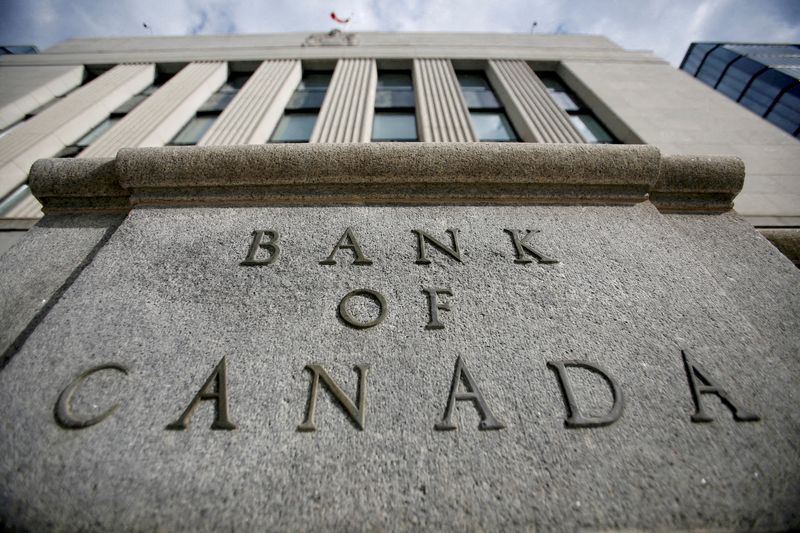By Fergal Smith
TORONTO (Reuters) - As Canada's economy overheats, the Bank of Canada is likely to be among the first of the major central banks to lift interest rates to a more normal setting even as worries persist about record-high levels of household debt, strategists say.
Money markets expect Canada's central bank to continue to raise rates by half a percentage point at its next two policy meetings, in June and July, after it hiked by that increment last month, its biggest single increase in 22 years.
That would lift rates to the bottom of the 2% to 3% range that the central bank estimates to be a neutral setting, or the level at which monetary policy is no longer stimulating the economy.
The economy likely expanded at an annualized rate of 5.6% in the first quarter. That's well ahead of the BoC's projections and compares with a contraction in the United States and barely any growth in the euro area.
"The BoC has the strongest case for already being at neutral of any peer group central bank out there," said Derek Holt, head of capital markets economics at Scotiabank.
Ending monetary stimulus could reduce the risk of inflation becoming embedded in the economy. The move is likely more urgent with economic activity exceeding capacity.
Among G7 central bank's, the Federal Reserve and the Bank of England could also lift rates to neutral in the coming months. The Fed's estimate of neutral is in line with Canada's central bank but the BoE's is much lower at 1.25% to 2.25%.
Unlike the Fed, Canada's central bank does not have a dual mandate targeting employment as well as inflation, nor has it adopted average inflation targeting.
"There may be that perception, especially with international investors, that the BoC is perhaps a bit more proactive and less tolerant of high inflation," said Jimmy Jean, chief economist at Desjardins Group.
Canada's inflation rate hit a 31-year high of 6.7% in March, while jobs have climbed well above pre-pandemic levels and the economy continues to benefit from a surge in commodity prices that has been amplified by the war in Ukraine.
Government spending continues to add economic stimulus in Canada, while population growth is raising demand for housing and other services, strategists at TD Economics, including Beata Caranci, said in a note.
"This means that the Bank of Canada may face a larger challenge than the Federal Reserve in snuffing out the inflation impulse," the strategists said.

Canada's economy is likely to be particularly sensitive to higher rates after Canadians borrowed heavily during the pandemic to participate in a red-hot housing market. Still, the BoC says the economy is strong enough to handle further tightening.
All the major central banks are "dealing with private debt and housing affordability issues but if anyone can pull off neutral – and beyond - then it's got to be the BoC," Scotiabank's Holt said.